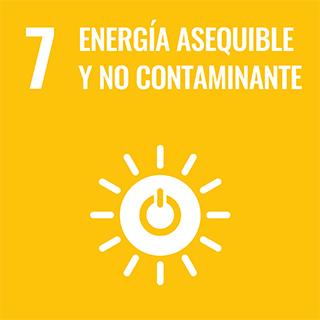
Indexado en
Licencia y uso

Grant support
The SFC project has received funding from the European Union's Horizon 2020 research and innovation program under grant agreement No 847593. The DisCo project has received funding from the Euratom research and training program 2014-2018 under grant agreement No 755443. The DisCo project has also benefited from financial support from project partner organizations as well as Waste Management Organizations involved in the project. We are grateful to all DisCo project participants who have performed the experiments and modeling.
Impacto en los Objetivos de Desarrollo Sostenible (ODS)

Análisis de autorías institucional
Ruiz-Hervias, JesusAutor o CoautorSpent nuclear fuel management, characterisation, and dissolution behaviour: progress and achievement from SFC and DisCo
Publicado en:Epj Nuclear Sciences & Technologies. 9 13- - 2023-02-21 9(), DOI: 10.1051/epjn/2022029
Autores: Sjoeland, Anders; Christensen, Petra; Evins, Lena Zetterstrom; Bosbach, Dirk; Duro, Lara; Farnan, Ian; Metz, Volker; Zencker, Uwe; Ruiz-Hervias, Jesus; Rodriguez-Villagra, Nieves; Kiraly, Marton; Schillebeeckx, Peter; Rochman, Dmitri; Seidl, Marcus; Dagan, Ron; Verwerft, Marc; Herranz Puebla, Luis Enrique; Hordynskyi, Dmitri; Feria, Francisco; Vlassopoulos, Efstathios
Afiliaciones
Resumen
SFC is a work package in Eurad that investigates issues related to the properties of the spent nuclear fuel in the back-end of the nuclear fuel cycle. Decay heat, nuclide inventory, and fuel integrity (mechanical and otherwise), and not least the related uncertainties, are among the primary focal points of SFC. These have very significant importance for the safety and operational aspect of the back-end. One consequence is the operation economy of the back-end, where deeper understanding and quantification allow for significant optimization, meaning that significant parts of the costs can be reduced. In this paper, SFC is described, and examples of results are presented at about half-time of the work package, which will finish in 2024. The DisCo project started in 2017 and finished in November 2021 and was funded under the Horizon 2020 Euratom program. It investigated if the properties of modern fuel types, namely doped fuel, and MOX, cause any significant difference in the dissolution behavior of the fuel matrix compared with standard fuels. Spent nuclear fuel experiments were complemented with studies on model materials as well as the development of models describing the solid state, the dissolution process, and reactive transport in the near field. This research has improved the understanding of processes occurring at the interface between spent nuclear fuel and aqueous solution, such as redox reactions. Overall, the results show that from a long-term fuel matrix dissolution point of view, there is no significant difference between MOX fuel, Cr+Al-doped fuel, and standard fuels.
Palabras clave
Indicios de calidad
Impacto bibliométrico. Análisis de la aportación y canal de difusión
El trabajo ha sido publicado en la revista Epj Nuclear Sciences & Technologies, y aunque la revista se encuentra clasificada en el cuartil Q3 (Agencia WoS (JCR)), su enfoque regional y su especialización en Nuclear Science & Technology, le otorgan un reconocimiento lo suficientemente significativo en un nicho concreto del conocimiento científico a nivel internacional.
Desde una perspectiva relativa, y atendiendo al indicador del impacto normalizado calculado a partir de las Citas Mundiales proporcionadas por WoS (ESI, Clarivate), arroja un valor para la normalización de citas relativas a la tasa de citación esperada de: 1.97. Esto indica que, de manera comparada con trabajos en la misma disciplina y en el mismo año de publicación, lo ubica como trabajo citado por encima de la media. (fuente consultada: ESI 14 Nov 2024)
Esta información viene reforzada por otros indicadores del mismo tipo, que aunque dinámicos en el tiempo y dependientes del conjunto de citaciones medias mundiales en el momento de su cálculo, coinciden en posicionar en algún momento al trabajo, entre el 50% más citados dentro de su temática:
- Field Citation Ratio (FCR) de la fuente Dimensions: 6.22 (fuente consultada: Dimensions May 2025)
De manera concreta y atendiendo a las diferentes agencias de indexación, el trabajo ha acumulado, hasta la fecha 2025-05-18, el siguiente número de citas:
- WoS: 5
- Scopus: 6
- Open Alex: 4
- OpenCitations: 4
Impacto y visibilidad social
Análisis de liderazgo de los autores institucionales
Este trabajo se ha realizado con colaboración internacional, concretamente con investigadores de: Belgium; Germany; Hungary; Sweden; Switzerland; Ukraine; United Kingdom.



